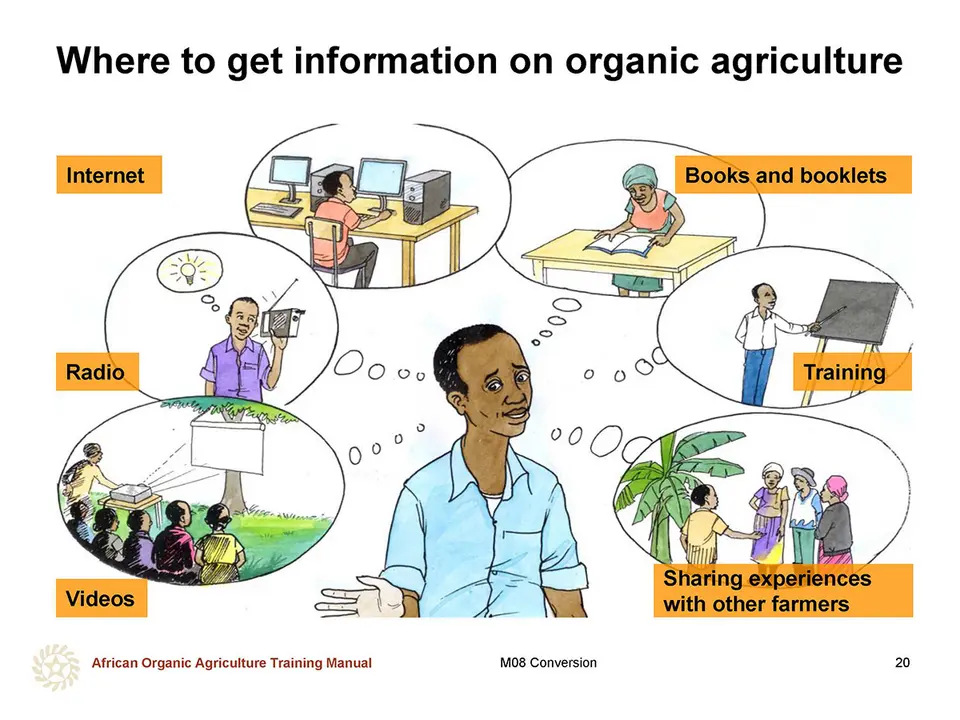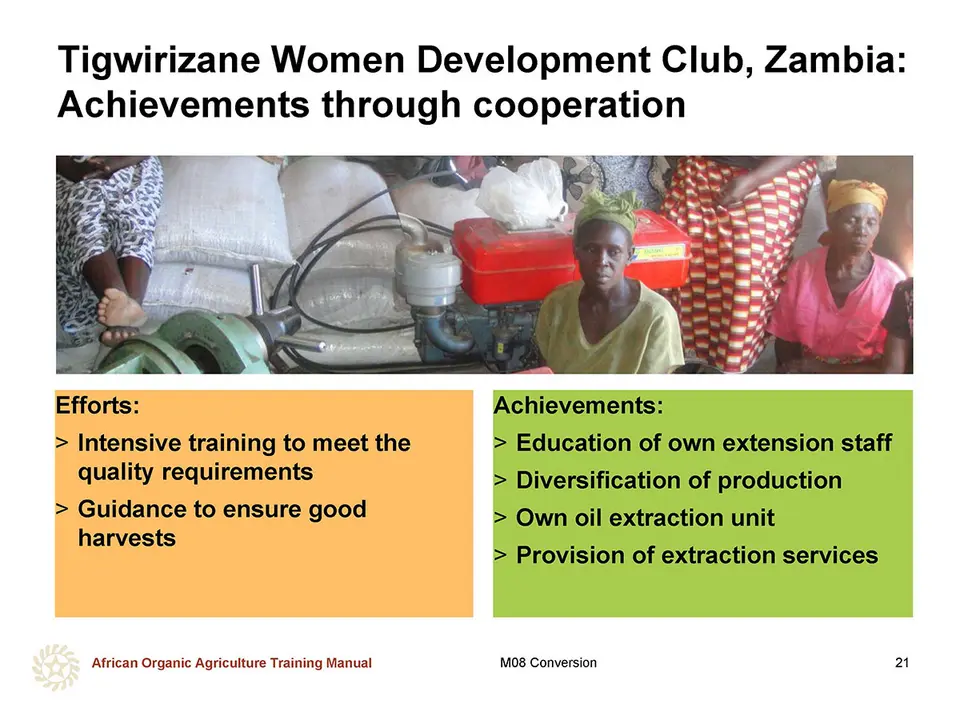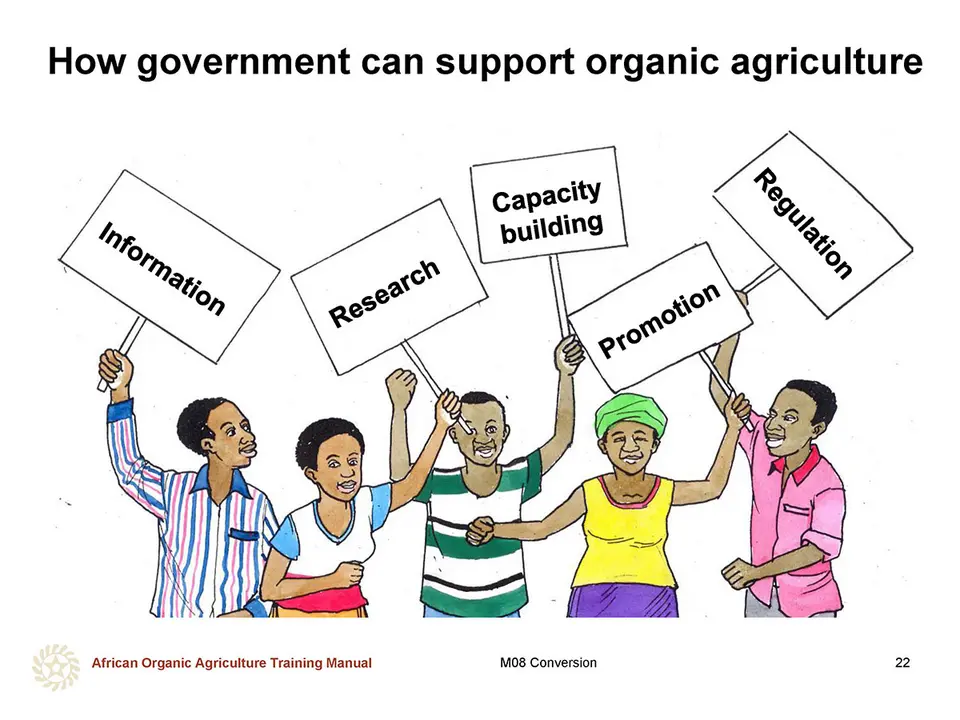Access to support and information during conversion
Farmers who want to produce organically need to learn a lot. Naturally curious farmers will feel well with this production method, as they will need to constantly look for information and learning opportunities. Information and support to organic farming is available in Africa, though still limited. Many initiatives, mostly on national level, are preparing information about organic farming and support farmers to convert.
At country-level, the immediate source of information and support is the national organic agricultural movement (NOAM) or any other local organizations that are promoting organic farming. The NOAMS such as NOGAMU, FENAB, KOAN, TOAM and OPPAZ are a contact point for local organic farmers, traders and other organic stakeholders, and can be very helpful in providing information needed for conversion to organic farming.
An overview of addresses and recommended literature for Africa is provided on the internet at www.organic-africa.net.
In addition to documentation and internet resources, there are also other sources of information available applicable for the African situation. One the most important sources are the other organic farmers or farmers who want to convert to organic. Farmer to farmer learning is a tremendous opportunity, but also necessary. Farmers also need to learn step by step, they do not need all information on organic farming at once. Farmers need specific information at a particular time to address a specific need.
The information sources for organic farming include:
- Farmer to farmer learning (discussions, farm visits, etc.)
- Organic trainings, seminars and meetings
- Inviting specialized advisors to the farm
- Books and other printed materials addressing organic farming issues
- Internet and radio
- Informal networks through fellow farmers, group members, buyers and consumers, business partners, local and village leaders
- The institutional networks like development (extension workers), research institutions and NGOs
Discussion on sources of information and support to organic farming
Give to the farmers an overview about regional, national and international information sources on organic agriculture and the kind of information they provide. Inquire if any of the participants have used any of the information sources and what their experiences are.
If possible, visit the main information sites in the internet and discuss the quality of the information provided. Inform the participants about training opportunities in organic farming. Hand out a list to the farmers with all contacts from where they can get organic farming information.
Cooperation among organic farmers
As an organized group of people interested in organic farming, there are many activities farmers can do together and many benefits that they can get, for example:
- Build an experience-sharing group for farmer to farmer learning during the conversion process (if possible with the support of an organic advisor). The goal is sharing of knowledge and experiences from practicing organic farming through regular meetings.
- Requesting training seminars together from training institutions at a cheaper cost or sometimes even for free.
- Collective marketing of organic products, where organic products are sold together in a common project (farmers, processors, traders). This may also include common postharvest facilities and the creation of a brand for organic products, so that the products are specifically marketed and sold to customers in urban areas or in export.
- Production and marketing of organic inputs such as organic seeds or compost within the group and to other groups.
Case study: Tigwirizane Women Development Club in Zambia - Networking and cooperation among farmers
Tigwirizane Women Development Club (TWDC) is a group of 20 women in Zambia. The club was founded by a development support organization to grow maize and groundnuts. These crops were grown traditionally just like all other farmers do, but TWDC experienced challenges in ensuring the quality and access good paying markets.
In 2005 following sensitization by the Organic Producers and Processors Association of Zambia (OPPAZ) the group joined OPPAZ and requested for services to convert them to organic farming. In response, OPPAZ embarked on a fast track programme that exposed the group to the various organic farming technologies clearly distinguishing it from traditional farming. OPPAZ also explained the benefits of organic farming in terms of competitive costs of production, good quality of products, assured access to lucrative markets, independence from external support, assurance for food security and potential for diversification into other value chains.
In 2007, the group membership grew to 150 persons as more and more farmers became interested in converting to a sustainable production system. Then OPPAZ came in with more lessons on ensuring good quality organic products and sensitivity to the demands of the markets. The message of ‘there is more to the product than the product itself’ was the focus of these lessons. TWDC members responded by developing and implementing local regulations to guide their activities individually as a way to ensure production according to required market standards. They also diversified into production of organic cotton and sunflower based on their internal regulations. Consequently, they appointed a community extension agent to help with routine extension support, advice, and liaison with OPPAZ technical staff. Under guidance from OPPAZ, the group set up and implemented an Internal Control System (ICS) for third party organic certification.
In 2008, the group for the first time produced 18 metric tons of good quality groundnuts without aflatoxins. In 2009 the group applied to Control Union for organic certification, which has since been granted. TWDC produced 30 metric tons of organic groundnuts in 2010 with a local farmgate value of USD 20,700. During the same year, the group constructed a 26 m2 oil extraction plant for sunflower and groundnut oil. Today TWDC has diversified their income sources to oil extraction services and selling of oil cake.
Government support to organic farming
Currently, there is little government support for organic farming in most African countries. However, over the past few years, organic farming has attracted growing attention from governments as an interesting option to access export markets and as a low cost, environmentally-friendly farming system. Organic farming is also being recognised as a sustainable approach to increase food security. For these reasons, government support is expected to increase in the coming years.
In some countries, governments have gone ahead to develop organic agriculture policies as avenues for eliciting more support for the sector. On the other hand, some governments are still subsidising chemical fertilizers and pesticides which make organic farmers uncompetitive. However, with proper information, farmers are taking on organic farming based on their knowledge and motivation and not only on the option to get cheap chemical sprays. International organizations and donors contribute to this debate and invest more and more support into organic farming projects.
Relevance of government support
Individual farmers do not depend on government support to start with organic farming. But government can provide highly valuable services and facilitate conversion and access to markets. The organic sector needs support from governments to grow, especially as the concern over the way food is produced, safety of food, the effect of farming methods on the environment and animal welfare is widely increasing.
Some of the areas where intervention by governments is needed include:
- The introduction of a national program to support and promote organic farming and the establishment of organic production standards and the regulation of organic products in the domestic markets. The information needs of the farmers on organic farming and markets should be addressed using the government network of extension service.
- There is a considerable need for research and capacity building on technical, economic and social aspects in the field of organic agriculture. The contribution of organic farming to the development of sustainable and environmentally friendly agricultural systems as well as the impacts of a widespread conversion to organic farming on public costs and benefits should be evaluated and supported.
Discussion on opportunities for government support
Invite a government representative to inform about government support to organic farming. Discuss the advantages of sustainable agriculture methods, for instance, for soil conservation and food supply and the need to promote these approaches.
Access to organic seeds
There are also still limited sources of certified organic seeds available in most African countries and, therefore, farmers should work together to collect, select and save enough seeds according to the requirements on their farms.
Organic seeds include any seeds or planting materials that are not treated with toxic chemicals and are used in the production of organic products. Therefore, most of the seeds available with farmers from their previous harvests can be used to grow organic crops. This includes seedlings, cutting or plant shoots, tubers and bulbs. The focus regarding organic seeds for the individual farmer is to be able to select and multiply own seeds on the farm and not to rely on purchased seeds.
Seeds from crops grown from hybrid seed varieties, as they are commonly sold by seed companies, should not be saved. Seeds saved from these varieties normally have poor performance when re-used because of the way they were originally produced.
Organic seed requirements for certification
For organic certification according to most standards, farmers are required to use only organic seed and planting materials, if available. If organic seed and planting materials are not commercially available, the following options (in order of preference) may be permitted with documentation that organic seed is not available:
- Seed grown only with substances in accordance with organic standards (can be from fields under conversion).
- Untreated seed and planting stock from neighbours or group members.
- Non-organic seed for perennial plants may be used. Perennial plants or crops must be managed organically for at least 12 months before harvest or sale as organic, but the original plants need not be organic.
Sharing knowledge on seed initiatives
Get information on or visit farmer initiatives that work on improving the quality of local cultivars and seeds. Let them share their experiences with the farmers.



 tap and then scroll down to the Add to Home Screen command.
tap and then scroll down to the Add to Home Screen command.